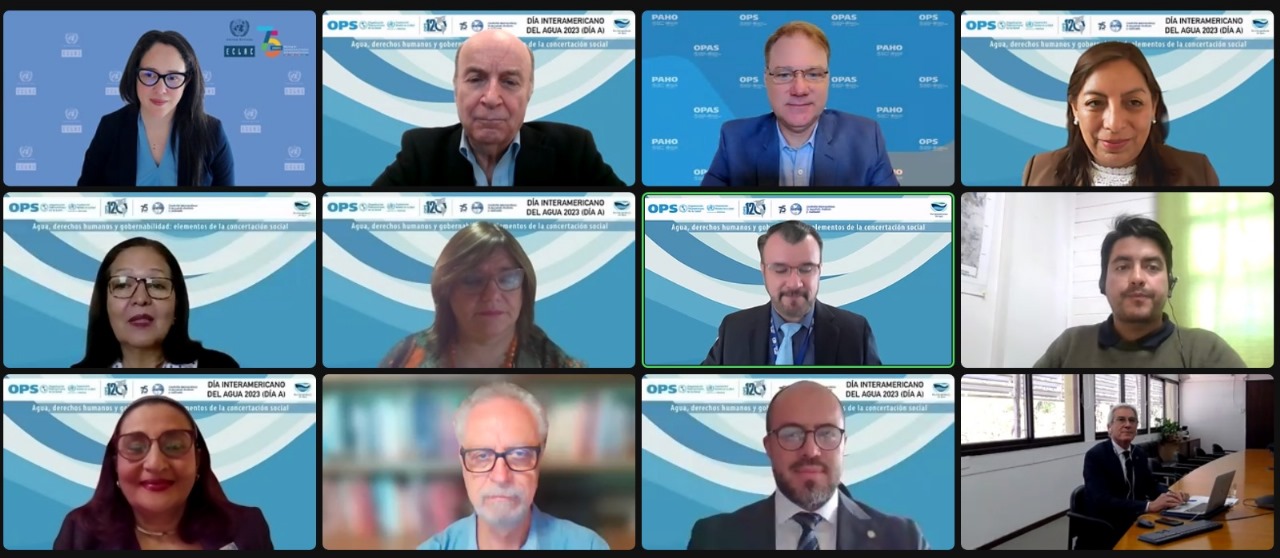ECLAC Participates in the Seminar: DIAA 2023 by AIDIS, Steering Towards Sustainable Water Governance
Work area(s)
Topic(s)
The DIAA 2023 seminar on October 6, 2023, orchestrated by the Inter-American Association of Sanitary and Environmental Engineering (AIDIS), explored the intersection of water governance, human rights, and social consensus in Latin America and the Caribbean. Several experts from different organisations were present to share their insights on these important themes.

Amid escalating water conflicts in Latin America and the Caribbean, addressing and analysing the root causes alongside governance mechanisms is vital to conflict prevention. The thematic seminar, DIAA 2023, grounded on numerous regional studies and experiences, emphasised integrated water resources management, universal water and sanitation access, and community participation.
Given the diverse interests across various sectors, promoting new strategies, tools, and mediation protocols is crucial for conflict prevention, guiding public policies towards sustainable solutions. The seminar aimed to unfold the general water agenda in the region and foster public awareness on water's significance for better conservation and supply.
In the opening of the seminar, Dr. Silvia Saravia Matus, Economic Affairs Officer responsible for Water Affairs at ECLAC, focused on the importance of water as an instrument of peace and a fundamental human right. She highlighted how, despite its immeasurable value, the price of water is often underestimated, which in turn creates significant gaps in access to water in the region. The increase in conflicts related to water management, such as hydroelectric projects, water privatization, and industrial pollution, was also emphasized. Additionally, she stressed the need for establishing effective water governance involving multiple stakeholders to address the geographical and temporal complexity of water resources. Finally, she reiterated ECLAC’s commitment to supporting the region's countries in institutional coordination and policy formulation to achieve a sustainable and equitable water transition.
Later, during the first panel of the seminar, Dr. Silvia Saravia Matus presented the Regional Water Action Agenda. This agenda, shaped by voluntary commitments expressed during the 2023 Water Dialogues, aligns with the UN's Water Valuation Principles and regional agreements. It encompasses five key areas of action covering sustainable development, climate, finance, cooperation, and ecosystem protection. Additionally, she presented details on the Water Sustainability Network and Observatory (ROSA), which aims to strengthen regional water management and information exchange. Dr. Silvia Saravia Matus also emphasized the dynamic nature of this instrument, highlighting its ability to adapt to address changing challenges in the field of water and contribute to peace and conflict resolution in the region.
Subsequent sessions further explored the human rights aspect and democratic governance in water management. Dr. Olger González discussed the interplay between water, human rights, and democratic governance, while Dr. Leo Heller delved into Agenda 2030's vision for water, sanitation, and hygiene from a human rights perspective. These discussions underscored the intrinsic link between water governance and human rights, advocating for a holistic approach to resolving water conflicts and promoting equitable water and sanitation access.
The seminar also tackled the typification of water conflicts, ranging from usage disputes to intergenerational, institutional, and user-non-user conflicts. Special attention was paid to the common conflict scenarios related to potable water supply.
Public awareness on water's significance was identified as crucial for conserving, preserving, and protecting water resources, thereby ensuring sustainable potable water supply. The seminar wrapped up with a forward-looking session on developing objectives for future conflict prevention, echoing a collective call to action for enhanced water governance.